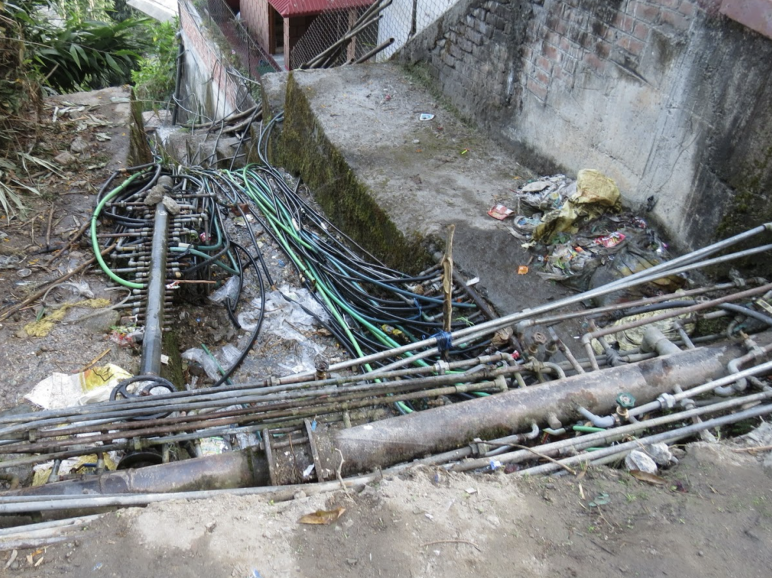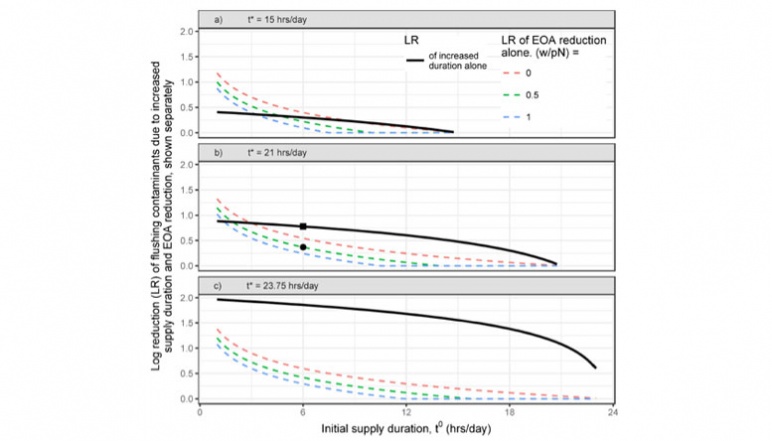Our Research Understanding effects of intermittent flow on drinking water quality

Unregulated pipe networks associated with intermittent water supply systems. Photo credit: stusinsite.blogspot.com

Model for estimating changes in contamination levels of delivered water through intermittent systems associated with increasing the supply duration and with improvements in pipe quality (through reductions in the Equivalent Orifice Area, EOA) Changes in EOA that are required to constrain system water losses (colored lines show allowances for 0%, 50% and 100% increase in physical water losses). Image credit: D. Taylor, A. Whittle, A. Slocum
Principal Investigator
Andrew J. Whittle
- Edmund K. Turner Professor of Civil and Environmental Engineering
- Department of Civil and Environmental Engineering
Andrew Whittle is the Edmund K. Turner Professor of Civil and Environmental Engineering. He has been an MIT faculty member since 1988. While primarily known for his expertise in geotechnical engineering, he has conducted research on a wide range of topics relating to infrastructure and the environment. He served as lead Principal Investigator of the SMART Center for Environmental Sensing and Modeling (CENSAM, 2007-2017), where his research focused on applications of wireless sensor networks for monitoring water distribution networks that led to creation of a successful start-up company, Visenti, Pte. His current J-WAFS project arises from his research on water quality sensors for the Roboat project. In 2010 he was elected to the U.S. National Academy of Engineering.
Challenge:
More than 1 billion people currently receive their drinking water supplies through pipe distribution networks that operate intermittently. We aim to understand how water quality is affected by the intermittent operation of these urban water distribution systems
Research Strategy
- Measure growth, detachment, and composition of biofilm within water pipes after sequences of flushing and stagnation
- Perform experiments in abandoned section of pipe within a monitored network system
- Collect data to update and refine current models of Intermittent Water Supply Systems (IWS)
Project description
Today nearly 1 billion people worldwide obtain their drinking water through piped distribution networks that operate intermittently and allow water inside the pipes to stagnate and depressurize between supply periods. As a result, these Intermittent Supply Systems (IWS) are inherently vulnerable to contamination due to intrusion through leaky joints, cracks or holes in the pipes, backflow, and/or through biofilm growth and detachment inside the pipes.
This research is investigating how changes in water quality associated with the IWS operations by measuring changes in water quality during controlled sequences of water supply (filling/flushing and steady state flow) and drainage/stagnation for a range of different duty cycles. This is being accomplished through controlled field tests using an abandoned section of pipe connected to a monitored testbed. The study focuses on biofilm growth as the source of biomass in the delivered water and the relative abundance of key microbial species including waterborne pathogens.
The study leverages extensive prior research on biofilm growth and composition within fully pressured water distribution systems networks and provides a more reliable basis for evaluating changes in water quality hypothesized in prior MIT research.
Outcomes
- Completed experiments on an instrumented testbed to evaluate how microbial communities within drinking water distribution systems are affected by intermittent water supply systems (IWS)
- Used flow cytometry (FCM) to measure the microbial biomass at the outflow of pipe sections that are pretreated to represent continuous vs intermittent water supply conditions
- Showed that the first flush of the IWS pipe causes a large, but transient increase in biomass, while smaller transients occur in the continuously flowing water pipes section (CWS) when transitioning from laminar to turbulent flow
- Used gene sequencing to investigate the diversity of microbial communities in the outflow (most of which derives from biofilm at the pipe surface) and found that there is a long-term development of the biofilm at the walls of continuously flowing water pipes
- Discovered that daily flushing associated with IWS operations prevents the establishment of a diverse microbial community within the biofilm
- Documented key findings in a publication co-authored with colleagues at SCELSE (NTU, Singapore)
Additional Details
Impact Areas
- Water
Research Themes
- Water Resources & Infrastructure
Year Funded
- 2019
Grant Type
- Seed Grant
Status
- Completed

